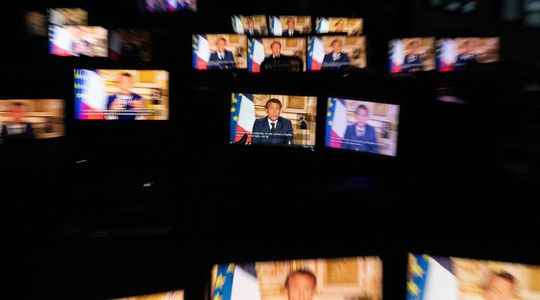History may remember that at the end of July 2022, Parliament buried a tax that fueled decades of political debate, coffee shop conversations or arguments over family lunches. After 90 years of good and loyal service for some, of flagrant injustice for others, the television license fee – sorry, the contribution to public broadcasting – should disappear on the occasion of the examination of the finance bill corrigendum to the Assembly from this Friday, July 22. Beyond the search for alternative funding for France TV, Radio France, Arte…, a whole era is disappearing. The one where public audiovisual reigned supreme on the screens, the one where the private media did not exist, the one where the world was divided between those – ultramajority – who had TV and the others.
For a long time, television license fees divided the world into camps of unequal sizes. On the one hand, the vast majority of French people who did it without (too much) complaining. Of course, they found it unfair, with its identical amount whether one was rich or poor (forgetting the exemptions provided for the most modest), but it never occurred to them not to pay it. Perhaps they silently envied the “courage” of those who boasted of exonerating themselves from it by cheating. For these, sport had become combat. They did not declare their device, especially in their country houses. They collected an old TV from friends, cousins or paid for their new device in cash so as not to leave traces. The game had only one time. The TV dealers, who had the obligation to identify the identity of their buyers and to transmit it to the services of the State, took their role seriously. And the less courageous cheaters fell into line.
A touch of snobbery among the “real” exempt
Only the real “exempt” remained, those special beings who really didn’t have a TV. We looked at them a little sideways to have the audacity to disdain a device that had largely entered homes. They assumed with a touch of snobbery not to be part of these popular and middle classes of which it was said then that they stupefied themselves by watching programs of sometimes questionable quality. Of course, they couldn’t talk to their office colleagues from the previous day’s show and their children sometimes felt a little lost in the recess discussions, but regardless, the absence of TV classified them as extraordinary individuals who read, listen to the radio, talk with their families.
They also took a certain pride in being able to attest on their honor in tax documents: “no, I don’t have a TV”. And when a tax official was overzealous enough to come and check in person for the absence of a skylight in the house, they made him walk around the rooms until he admitted defeat. From time to time, they wondered where was the logic of all that since by not paying the license fee, they still had access to public radio. A media that they consumed quite assiduously, France Inter was one of their favorite radio stations. But they still weren’t going to beg to pay a tax from which they had been very legally exempt since the early 1980s.
A tax deemed increasingly unfair
They, like us, did not yet know that, soon, “dad’s TV” would be just an old memory and that we could watch television until we died, without paying anything and completely legally. Computers – at the apple or without -, streaming offers and high-speed Internet would introduce an increasingly incomprehensible distinction between the French. From now on, everyone had access to the same programs, but some paid the license fee because they watched them on a good old television set and the others did not, because they contented themselves with a computer screen/ a tablet/phone. Already the emergence of private TVs in the 1980s had shown the absurdity of the system. You could only watch these channels funded by advertising and not beneficiaries of the said fee and still pay the 138 euros per year claimed by the State. Over the years, this good old tax has become increasingly unfair. Many times, there was talk of making it disappear. The politicians have always backtracked.
During the 2022 presidential campaign, Emmanuel Macron announced his intention to remove it. One would have thought that he would be unanimously applauded. A wind of revolt has, on the contrary, blown. Some have called for its maintenance with force. Their motivation is noble: to guarantee the independence of the public service by preserving the principle of a dedicated recipe. But the argument is not enough to justify the survival of the royalty in its current form. Too closely linked to the “daddy’s TV” of our childhood, a TV that the youngest hardly watch, it only fuels an already too widespread populist anger.
